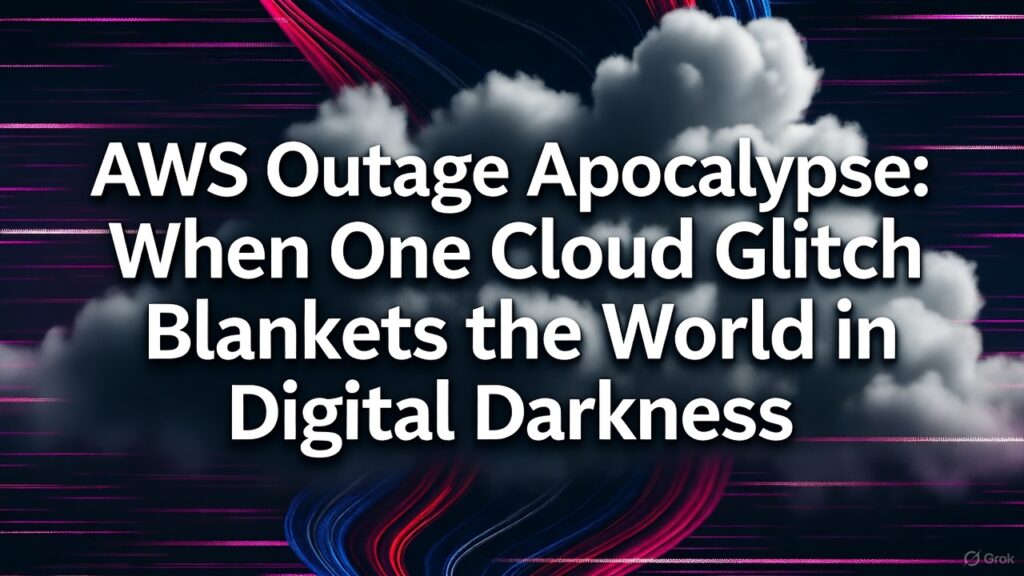A couple days back there was widespread internet outage was caused by a failure at Amazon Web Services (AWS), the world’s largest cloud computing provider. AWS enables companies to rent server space to host their websites, apps, and services, but when a critical DNS (Domain Name System) failure occurred at one of its main data centers in North Virginia, over 1,000 companies, including major companies like Snapchat, Reddit, and WhatsApp, experienced downtime for many hours.

This incident highlighted the fragility of the internet’s infrastructure, revealing how heavily dependent the digital world is on a handful of tech giants, particularly AWS. The outage instigatd renewed debate among lawmakers and industry experts about whether such concentration of power in the hands of a few corporations is sustainable or poses risks to global connectivity.
Senator Elizabeth Warren notably called for breaking up big tech companies, stressing that no single firm should have the ability to disrupt the entire internet. The event highlighted the internet’s vulnerability and sparked a bigger conversation about decentralization, competition, and resilience in digital infrastructure.

Highlights
- ⚠️ Amazon Web Services (AWS) failure caused a massive internet outage affecting over 1,000 companies.
- 🌐 Major apps like Snapchat, Reddit, WhatsApp, and even online banking services were disrupted.
- 🖥️ The root cause was a DNS failure at a key AWS data center in North Virginia.
- 🔌 AWS’s dominance highlights a fragile internet infrastructure reliant on a few cloud providers.
- 💰 Renting server space from AWS is cost-effective for businesses but centralizes risk.
- 🏛️ US lawmakers, including Senator Elizabeth Warren, used the outage to call for big tech regulation.
- ⚡ This incident reignited debates over antitrust laws and the need to decentralize internet services.
Key highlights
- ☁️ AWS’s Role as the Backbone of the Internet: AWS manages as a massive cloud warehouse, storing and managing data and services for countless companies worldwide. Its scale and efficiency have made it indispensable, but this concentration creates a single point of failure. The outage demonstrated how the internet’s infrastructure is not as distributed as commonly perceived; in reality, it depends heavily on a few major cloud providers.
- 🛠️ DNS Failures Can Cripple the Digital Experience: The Domain Name System acts like the internet’s phone book, resulting in user-friendly URLs into IP addresses. When AWS’s DNS system failed, devices couldn’t locate websites or apps, rendering them inaccessible even though they were still operational behind the scenes. This shows how foundational DNS is to every online interaction and why its failure can have widespread and immediate consequences.
- ⚖️ Centralization vs. Decentralization Debate: The outage started the ongoing debate about the concentration of internet infrastructure. While centralized cloud services offer efficiency, scalability, and cost savings, they also create systemic risks. If a single provider or data center fails, it can lead a global disruption, as seen with AWS. The incident has fueled arguments for diversifying hosting solutions and increasing competition in cloud services to build resilience.
- 🏛️ Political and Regulatory Implications: Senator Elizabeth Warren and other lawmakers see the AWS outage as evidence that tech giants wield too much power over important digital infrastructure. The incident has started calls for stronger antitrust actions and regulatory oversight to prevent monopolistic control and to promote a more competitive internet landscape. The debate also hihglights on whether breaking up big tech companies could help safeguard the internet’s stability.
- 💡 Business Reliance on Cloud Providers: Many businesses opt to rent server space from cloud providers like AWS instead of maintaining their own infrastructure due to cost and convenience. But, this reliance means that a failure at the cloud provider level directly impacts a vast array of services and users. Companies must balance operational efficiency against the risk of dependency on external providers and consider multi-cloud strategies or failover systems to mitigate such risks.
- 🌍 Global Impact of Localized Failures: The outage originated in a single AWS data center in North Virginia but quickly propagated worldwide, affecting users across many countries. This demonstrates how interconnected and interdependent the internet is. Localized technical issues can have far-reaching global repercussions, emphasizing the need for geographically distributed infrastructure and robust disaster recovery plans.
- 🔄 The Internet’s Illusion of Endless Availability: Many users assume the internet is an inexhaustible, always-on resource. The AWS failure shattered this illusion by showing how a single error can cause widespread disruption. This awareness could drive demand for more transparency from cloud providers and for innovations focused on building a more fault-tolerant and resilient internet ecosystem.
Conclusion
The AWS outage is a wake-up call about the vulnerabilities inherent in today’s internet infrastructure. While cloud computing has revolutionized how businesses operate online, it has also concentrated critical resources with a few dominant players, creating systemic risks that affect millions of users globally. The failure stresses the importance of addressing these risks through regulatory measures, technological innovation, and strategic diversification of cloud services. As the internet becomes ever more central to daily life, ensuring its resilience and reducing dependency on single points of failure will be paramount to maintaining digital continuity and security.



